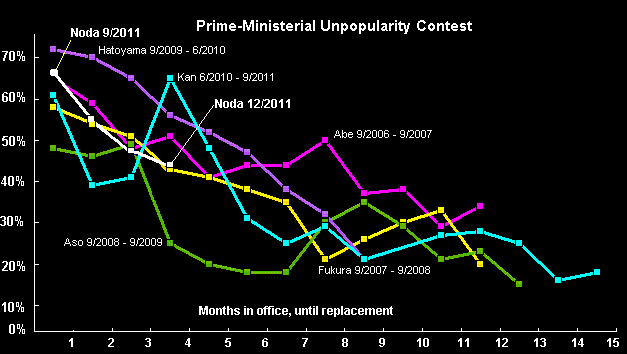The plunging approval ratings of Japanese Prime Minister Yoshihiko Noda continue the tradition of all Japanese prime ministers since Junichiro Koizumi—there were six of them in five years. Public approval is high at the start when voters hope that things will change. As reality sets in, approval skitters down a steep slope that lasts 8 to 15 months. When it drops into the low twenties, the prime minister is kicked out, and a new guy is installed.
Days after being appointed on September 2, Noda reveled in a public approval rating of 63%. Early October, it plunged to 55%. Early November, it plunged to 47%.
The November poll was taken after he’d announced legislation that would raise the national consumption tax from 5% to 10%. Government deficits have spiraled out of control. Gross national debt is 230% of GDP (it makes Greece’s 160% look virtuous). Japanese Government Bonds, rated AA-, are facing further downgrades. Something needs to be done. And Noda asked consumers to do it.
The latest poll, conducted in early December, wasn’t kind either. The ongoing discussion about the consumption tax dragged down his approval ratings to 44.6%. Other issues weigh as well, such as frustration with the disaster reconstruction efforts, response to nuclear contamination issues, and an increasing public distrust in the political parties. The prime-ministerial unpopularity contest continues:

Noda’s disapproval rating jumped by 6 points to 40.3%. More than half of those surveyed want a general election before the new consumption tax is enacted. Only 25.4% supported his plan to hold an election after enacting the legislation.
Even voices within Noda’s Democratic Party of Japan (DPJ), have expressed concern about the tax increase at a time when the economy is fragile. Ironically, to keep the economy afloat, the government just advanced another “supplemental budget” (stimulus package), the fourth this year, unprecedented since World War II. And the tax increase is under attack from the Liberal Democratic Party (LDP) which ruled Japan almost continuously from 1955 until 2009.
After Japan’s bubble burst in 1989, the government resorted to deficit spending to prop up the economy, which accomplished two things: sporadic upticks in GDP and an explosion in government debt. At 230% of GDP, and still growing, that debt can no longer be serviced by a workforce that is shrinking—a result of two demographic shifts: decades of low birth rates and the retirement of baby-boomers.
And cracks have appeared in two other pillars that support the debt: the savings rate has sunk to American levels, and the trade surplus has been replaced by deficits at regular intervals (five months so far this year).
So, is Japan at the brink of an epic collapse? Are JGB yields going to spike? Is it time, finally, after 20 years of false hope, to short JGBs?
Funding hasn’t been a problem: due to Japan’s institutional setup and insular psychology, it has been able to sell 95% of its JGBs within Japan. Individuals directly or indirectly hold over 50%. Government-owned or controlled institutions hold over 40%. Among them: the Government Pension Investment Fund, one of the largest pension funds in the world; the government-owned Post Bank, the largest deposit holder in the world; financial institutions the government can lean on; and the Bank of Japan.
There is essentially no free market for Japanese debt, and foreigners hold only 5%. Whenever the BoJ, the Ministry of Finance, and politicians say, “Buy these crappy bonds at these ridiculously low yields,” buyers fall in line. Example: the planned sale of reconstruction bonds. Those who buy certain amounts and hold them for specified periods get a gold trinket as reward, rather than yield. And it’ll work.
It’s easy to underestimate just how powerful Japan Inc. is, and how powerless elected officials are. Prime ministers are replaced when the public gets frustrated. But the bureaucrats and corporate interests that control a big portion of the economy remain in place.
It’s also easy to underestimate how cohesive and homogeneous Japanese society is, and how willing the people are to sacrifice for a common good, namely Japan, as long as Japan takes care of them in return. So far, that pact has worked. While Japan’s debt will blow up eventually, it’s not clear when, and it’s not clear how. The Japanese might very well make a collective decision to deal with it in a manner that seems incomprehensible to the rest of the world. And anyone who bets against Japan Inc. and its debt should keep that in mind.
Enjoy reading WOLF STREET and want to support it? You can donate. I appreciate it immensely. Click on the mug to find out how:
![]()

